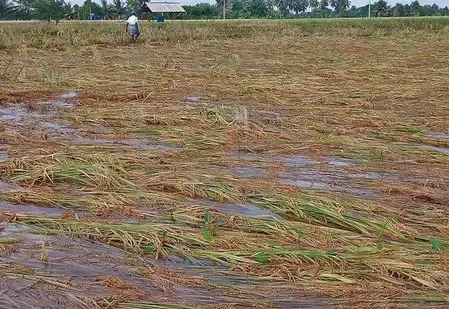Are Farmers in TN Delta Districts Facing Severe Rain Damage and Delayed Paddy Procurement?

Synopsis
Key Takeaways
- Farmers in TN's delta districts are facing immense challenges due to heavy rains and delayed paddy procurement.
- Thousands of tonnes of harvested crops are at risk of damage or decay.
- Government intervention has been criticized for being late to prevent losses.
- Coordination issues in procurement operations have exacerbated the crisis.
- Immediate steps are required to address storage and transportation bottlenecks.
Chennai, Oct 23 (NationPress) As senior officials from the ruling DMK and the Opposition AIADMK inspect the delta districts to gauge the repercussions of the northeast monsoon, the plight of farmers continues to escalate throughout the Cauvery region. The dual challenges of postponed paddy procurement and torrential rains have put thousands of tonnes of harvested Kuruvai crops in jeopardy, either damaged or at risk of decay.
On Wednesday, Edappadi K. Palaniswami, the Leader of the Opposition and general secretary of AIADMK, toured various districts in the delta area, engaging with farmers and examining rain-soaked piles of paddy left outside Direct Procurement Centres (DPCs).
Simultaneously, Food and Civil Supplies Minister R. Sakkarapani convened meetings with district officials to assess procurement and storage strategies, promising that immediate actions were underway to hasten the lifting and milling processes. Nonetheless, farmers’ groups voiced that the government’s intervention arrived too late to avert losses.
P.R. Pandian, the president of the Coordination Committee of All Farmers Associations of Tamil Nadu, described the scenario as “a historical bottleneck,” attributing it to inadequate planning and coordination in procurement efforts.
“This year, more than 6.31 lakh acres were cultivated under Kuruvai, producing close to 13 lakh metric tonnes of paddy,” Pandian noted. “However, only around six lakh tonnes have been procured to date, leaving nearly four lakh tonnes vulnerable to the rains. Another two lakh tonnes are still awaiting harvest. Paddy bags have been sitting for days in front of DPCs, now drenched by relentless rain.”
In Nagapattinam district, where over 1.1 lakh acres were cultivated — the highest in recent times due to consistent Mettur water releases — farmers expressed that the rain has drastically transformed what seemed to be a promising harvest.
Cauvery S. Dhanapalan, general secretary of the Cauvery Farmers Protection Association, stated: “This season’s Kuruvai crop was exceptional, but persistent rainfall has ruined flowering and adversely impacted the samba crop as well. More than 60 percent of Kuruvai has been harvested, but much of it remains soaked outside DPCs.”
Farmers reported that DPCs are operating well beyond their intended capacity, designed to accommodate about 3,000 sacks but currently holding over 10,000.
Limited storage capacity, transportation issues, and slow stock movement to rice mills have exacerbated the predicament. “There’s confusion surrounding milling orders, a shortage of loaders, and a lack of cooperation among agencies,” Dhanapalan asserted. “Barely one-tenth of the paddy arriving at DPCs is being procured, while the remainder is left to perish in the rain,” he concluded.










